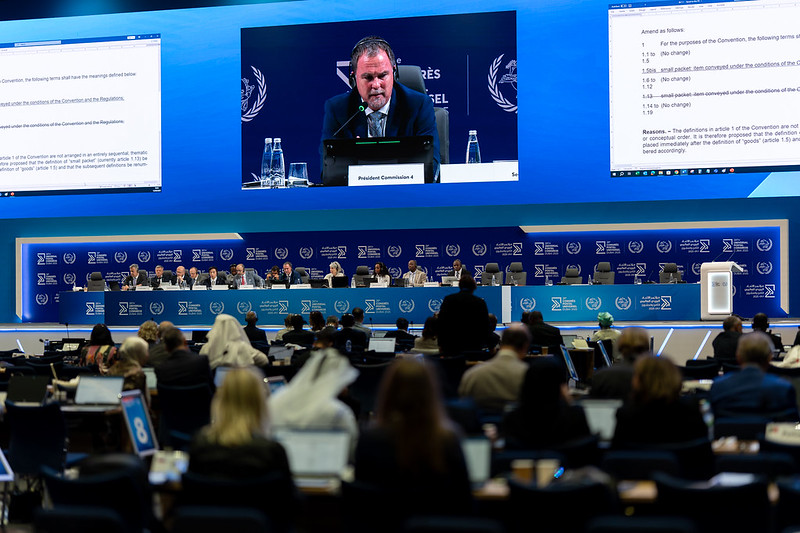The UPU’s 28th Congress has approved a raft of proposals that will make critical adjustments to the portfolio of postal products, their remuneration and their quality of service. These changes are designed to better meet the needs of customers and e-commerce platforms.
The adopted proposals are part of the continuing evolution of international postal products and pricing models, while also driving quality improvements through three interconnected four-year roadmaps: the Integrated Product Plan (IPP), the Integrated Remuneration Plan (IRP), and the Integrated Quality of Service Plan (IQP).Felix Blaich, Director of International Relations at Deutsche Post, represented Germany as Chair of Congress Committee 4, which was responsible for discussing and approving these progressive plans.
“When the UPU was founded 150 years ago, there was no alternative to the postal network, to the UPU exchange of letters and parcels, but, 150 years later, we are now in a situation where there’s fierce competition in most of the markets of the world,” said Blaich.
“We have to meet what the customer wants and it’s textbook that customers decide upon three dimensions: the product, the price and the quality of service. The three reports we’ve adopted in Committee 4 … are updating and modernizing the network to meet the 21st Century customer’s needs on these three dimensions,” he added.
Evolving products
The rise of new global online marketplaces and accelerated e-commerce adoption since the COVID-19 pandemic is reshaping consumer behaviour, with a greater focus on convenience and transparency.
At the same time the UPU is responding to demands for new solutions to address, for example, the growth in B2B2C business models, the rise in e-commerce platforms and shippers looking for universal, integrated, data-enabled delivery networks that provide a reliable, affordable and convenient service.
The IPP addresses customers’ and operators’ demands for a simplified, streamlined products portfolio – including letters, parcels and EMS – and gearing it towards a menu-driven approach where customers have access to a range of supplementary added-value services that meet their specific needs.
Under the IPP, the Congress approved proposals to introduce an optional proof of delivery service for parcels, which now enables them to be delivered without a signature requirement.
Further changes include limiting insured items service to priority letter-post items containing only documents and parcels, the introduction of delivered duty paid services, reducing the weight of large letters to a maximum of 1 kg, and the discontinuation of the now redundant ECOMPRO parcel.
Modern and integrated remuneration
The Congress’s discussions on remuneration featured two components – deciding on a group of proposals implementing a new Integrated Remuneration System (IRS) for 2026-2030 to further modernize and integrate the UPU remuneration systems, and adopting the IRP for 2026-2029, which will guide the development of the next IRS beyond 2030.
The IRS adopted is designed to better reflect the actual costs of international mail handling and delivery by shifting the focus from format to content, separating documents and goods. This separation ensures fairer remuneration by aligning payments with the composition of mail flows. It also improves accuracy by applying remuneration on a per-item basis, rather than a per-kilo average, accommodating the shift in content and weight variability.
For small packets, remuneration will be based on the exact number of items received rather than an average weight. For parcels, the IRS introduces fundamental changes: destination operators will be able to self-declare rates charged to sending operators, based on domestic tariffs of equivalent services. This new approach will also gradually be applied to replace the current inward land rates system used for remunerating parcels.
The IRS will also link parcel remuneration to quality of service, incentivizing reliable and predictable delivery – a critical factor for e-commerce platforms, sellers, and customers. The IRS will move the UPU network toward a globally uniform methodology, strengthening its position in a competitive market where customers can easily switch providers.
Finally, the IRS safeguards affordable access by addressing the special circumstances of low-volume countries and those with socially guided domestic tariffs, ensuring inclusivity across the network.
Improving quality of service
The Congress also passed the IQP and its package of associated proposals unanimously.
As e-commerce grows, customer demand for faster and more visible delivery has intensified. Yet UPU data shows delivery times for small packets and parcels have slowed over the past four years, prompting sellers to turn to non-postal networks. The IQP and associated proposals adopted will ensure reliable, customer-focused postal services that keep pace with e-commerce.
The IQP introduces a harmonized quality measurement system for goods, providing a global view of reliability. Mandatory scanning events will increase from six to twelve, giving customers end-to-end visibility and improving predictability. Service performance attributes linked to remuneration will further motivate operators to raise standards.
A key innovation is the Integrated Quality of Service Management Methodology (IQMM), a six-step framework for continuous improvement. Combined with a modernized certification process tied to performance-based rankings, the IQP equips postal operators with tools to enhance delivery, efficiency, and resilience across the global network.
